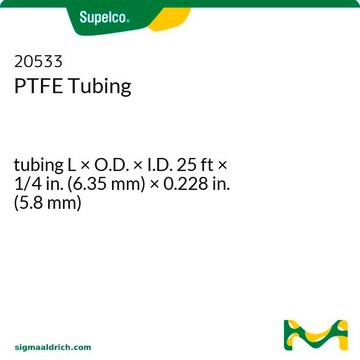06735
tert-Butyldimethylsilyl chloride
for GC derivatization, LiChropur™, ≥99.0% (GC)
Synonym(s):
tert-Butyl(chloro)dimethylsilane, tert-Butyldimethylchlorosilane, TBDMSCl
About This Item
Recommended Products
grade
for GC derivatization
Quality Level
Assay
≥99.0% (GC)
quality
LiChropur™
reaction suitability
reagent type: derivatization reagent
reaction type: Silylations
technique(s)
gas chromatography (GC): suitable
bp
125 °C (lit.)
mp
86-89 °C (lit.)
SMILES string
CC(C)(C)[Si](C)(C)Cl
InChI
1S/C6H15ClSi/c1-6(2,3)8(4,5)7/h1-5H3
InChI key
BCNZYOJHNLTNEZ-UHFFFAOYSA-N
Looking for similar products? Visit Product Comparison Guide
related product
Signal Word
Danger
Hazard Statements
Precautionary Statements
Hazard Classifications
Aquatic Chronic 2 - Eye Dam. 1 - Flam. Sol. 1 - Skin Corr. 1A
Storage Class Code
4.1B - Flammable solid hazardous materials
WGK
WGK 2
Flash Point(F)
71.6 °F - closed cup
Flash Point(C)
22 °C - closed cup
Choose from one of the most recent versions:
Already Own This Product?
Find documentation for the products that you have recently purchased in the Document Library.
Customers Also Viewed
Articles
Results of a study involving the ability few Fluka silylating reagents to form GC-MS-compatible trimethylsilylmethyl derivatives of NSAIDs
Results of a study involving the ability few Fluka silylating reagents to form GC-MS-compatible trimethylsilylmethyl derivatives of NSAIDs
Results of a study involving the ability few Fluka silylating reagents to form GC-MS-compatible trimethylsilylmethyl derivatives of NSAIDs
Results of a study involving the ability few Fluka silylating reagents to form GC-MS-compatible trimethylsilylmethyl derivatives of NSAIDs
Our team of scientists has experience in all areas of research including Life Science, Material Science, Chemical Synthesis, Chromatography, Analytical and many others.
Contact Technical Service














